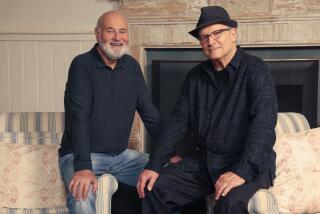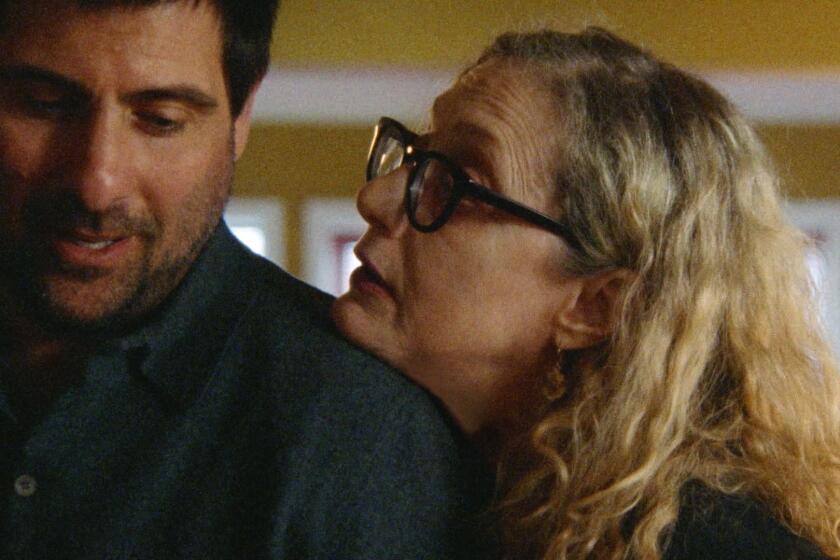GETTING THROUGH ‘OZ’ WITH HELP OF HIS FRIENDS
George Lucas was in Japan early last year when he learned that his longtime friend and frequent collaborator Walter Murch was in trouble on the set of “Return to Oz” in London. Francis Coppola, another old friend and colleague, was in Los Angeles when he heard the news.
Within a week, Lucas and Coppola were on the Elstree Studios lot, lending moral support--and in the case of Lucas, advice--to help Murch keep his job as director of the $25-million “Wizard of Oz” sequel. Murch, an Oscar-winning sound and film editor, had never directed a movie before, and it looked as if he wouldn’t finish directing this one.
“Walter just frankly ran out of steam,” said producer Paul Maslansky, shortly after the crisis occurred in March, 1984. “He was exhausted. . . . He just sat down in his chair and said, ‘I can’t do it.’ ”
“I was falling behind,” Murch says, “and I began to doubt myself.”
So, after more than 10 years of off-and-on writing, three years of pre-production and five weeks of actual filming, Murch found himself unemployed . . . for about 48 hours.
That’s how long it took Lucas, who was in Japan on business, to find out that Murch had been fired, and to talk Maslansky and Disney executives into reinstating him. The magic words from Lucas, recalls Maslansky: “I’ll come over and help.”
Murch, now on a promotional tour to promote today’s opening of “Return to Oz,” says he fell behind because of the complexity of scenes involving puppets and mechanically operated characters, and because English labor laws limited 9-year-old Fairuza Balk, who plays Dorothy, to a maximum of 3 1/2 hours of work per day.
Not even Lucas has the clout to rewrite British law, but his “Star Wars” trilogy had given him some experience with complex special effects, and he quickly accelerated Murch’s productivity.
“He just explained to me that basically you have to expect that mechanical things will not work,” Murch says, “and that you can’t wait for things to start working again. You have to be ready to move on to something else.”
Coppola, who dropped in on the set unannounced, was there for two days. Spielberg was there for one. Lucas’ first visit lasted four days. He came back several times.
“Mostly, he was there as a friend to give me a boost,” Murch says. “He got me going again.”
Maslansky said Lucas’ presence alone re-energized the crew, and one week after the firing-rehiring of Murch, the production was back on track.
“Walter never looked back,” Maslansky says. “It was just one of those emotional hiccups that happens to everyone.”
If this were a movie, there would be a flashback right here, showing two college film students--Murch and Lucas, in the mid-’60s--sitting outside a dean’s office at USC.
As Murch tells it: “There was a very important film-making scholarship, and the faculty said it was between George and me. While we were sitting outside, waiting to find out, we made a pact that whoever got the scholarship, he would turn around and help the other guy.”
Lucas won, and made “THX-1138.” He hired Murch to co-write it.
Soon after, Murch met Coppola, joined his fledgling American Zoetrope and developed a reputation as one of the industry’s best film and sound editors. He won Oscars for his work in both departments on Coppola’s “The Conversation,” and he won a third for his sound editing on “Apocalypse Now.”
Murch says he always intended to become a director, and “Return to Oz” is the film he always wanted to direct first. It just happened that the movie he envisioned required nearly every effect and optical trick known. Plus, working with live animals, children and robots.
It was overwhelming.
“When they fired me, I felt both despair and relief,” he says. “It was as if you were trying to hold onto the edge of a cliff and, finally, somebody nudged you and you were falling. I was falling, but at least I didn’t have to worry about hanging on to the cliff anymore.”
HONOR STUDENTS: Producer Mark Carliner got a frantic call from screenwriter John Fusco recently. Fusco wrote the script for “Crossroads,” a blues film that Walter Hill is directing for Carliner and co-producer Tim Zinnemann, and Fusco says Carliner had forgotten to give him a grade on it.
A what?
“He said he couldn’t graduate until I gave him a grade,” Carliner says, explaining that Fusco wrote “Crossroads” as his master’s thesis at New York University and that Carliner had served as Fusco’s independent study adviser on it. “I called the school and said, ‘I gave him an A+ and a quarter of a million dollars.’ ”
Carliner is rapidly becoming a legend on Eastern college campuses. Two years ago, he dusted off another N.Y.U. graduate’s master’s thesis--Charles Purpura’s “Catholic Boys” (released by MGM/UA as “Heaven Help Us”)--and he’s currently developing a play, also a master’s thesis, by Rutgers graduate student Michael Folie.
Meanwhile, his other discoveries, Purpura and Fusco (who was paid $175,000 for “Catholic Boys”), have all the follow-up work they can handle. Purpura has a three-picture deal with Disney, and Fusco has two more scripts in development with Carliner.
Before you dig out that script you wrote back at Slippery Rock and address it to Carliner, you should know he rates your chances at no better than if you just tossed it over the nearest transom.
“For every script like John Fusco’s or Charles Purpura’s, there are 200 that are stiffs,” says Carliner, a Harvard MBA whose background until recently had been in television. “If you can even find a heartbeat in one, it’s rare.”
Carliner says he shared a house with Steven Spielberg 14 years ago, when both were young and unable to get anyone to take them seriously in Hollywood, and that frustration has made him sympathetic to young talent.
“There are good young writers and directors out there, but because they’re young and inexperienced, no one’s interested in them,” says Carliner, 46. “Now I’m in a position to do for them what I couldn’t do before.”
Carliner isn’t doing all of his recruiting on college campuses. His next film, he believes, will be “Double Vision,” an erotic thriller written by Mick Garris. It will be Garris’ first film but not his first credit. Just after Carliner optioned “Double Vision,” Garris was hired as story editor and scriptwriter for Spielberg’s “Amazing Stories” TV series.
Spielberg is sympathetic to young talent too.
SHUTTLE GAMES: Do you believe it’s possible that a group of precocious teen-agers could accidentally end up in orbit in a space shuttle, and be asked to bring it down themselves?
NASA says it is, and producer Leonard Goldberg, whose “WarGames” exploited the possibility that a computer whiz could accidentally trigger World War III, is going to dramatize it for us in “Space Camp,” a $14-million “science fact” film to be released by 20th Century Fox next Easter.
The title refers to a privately operated nonprofit program that really exists in Hueytown, Ala. The 3-year-old Space Camp puts 3,000 to 4,000 teen-agers a year through simulated astronaut training programs that Goldberg says are approved by NASA. The space agency is also cooperating with the production company, he says, supplying film footage from shuttle flights and technical advice.
“Space Camp” begins shooting Monday in Los Angeles, then moves to Hueytown and Cape Canaveral. Kate Capshaw will play the astronaut adviser caught up in the kids’ adventure. Harry Winer, who has worked with Goldberg on several TV programs, will direct.
More to Read
Only good movies
Get the Indie Focus newsletter, Mark Olsen's weekly guide to the world of cinema.
You may occasionally receive promotional content from the Los Angeles Times.










